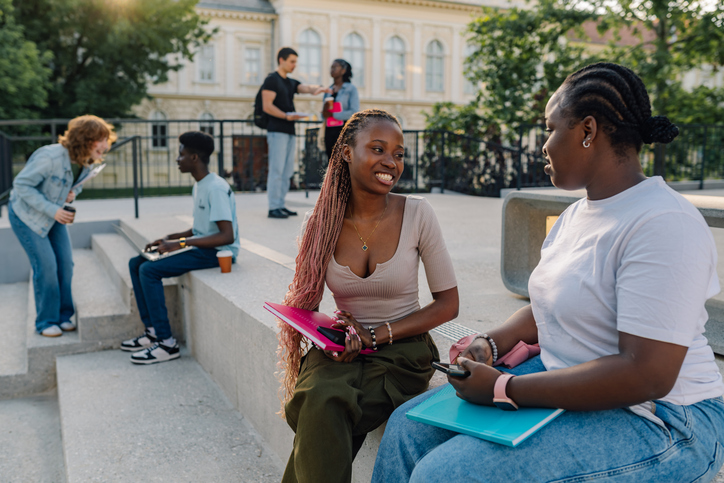Breaking Down The Stereotype: What Does It Mean To Talk Black?
Source: zamrznutitonovi / Getty
Language is a dynamic reflection of culture, yet it often falls prey to stereotypes and misconceptions. One prevalent stereotype centers around the concept of “talking Black,” a term that oversimplifies and generalizes the linguistic diversity within Black communities.
It is vital to understand that there is no monolithic “Black” way of speaking. The Black community is extraordinarily diverse, encompassing various cultural backgrounds, geographic regions, and linguistic traditions. Just as there are countless languages and dialects globally, there exists a rich tapestry of linguistic styles and patterns within Black communities.
The association between language and stereotypes is profound.
The stereotypes surrounding “talking Black” trace back to historical biases and societal attitudes toward African American Vernacular English (AAVE), also known as Ebonics. Historians believe that its origins can be traced to English dialects introduced into the American South during the 17th and 18th centuries, as detailed in The Oxford Handbook of African American Language. These dialects were adopted and adapted by African Americans, influenced by both British English dialects and African languages, as well as creole varieties from the Caribbean brought over by enslaved people from the region.
Although AAVE is often unfairly criticized as slang or incorrect English, it is a distinct linguistic system with unique grammar, vocabulary, and pronunciation traits such as dropping “-ing” (e.g., “goin’” instead of “going”) and r-lessness. For example, “fo’” instead of “four,” according to Frontiers In Psychology.
In a 2021 study conducted by a peer-reviewed journal, participants listened to 20 audio recordings featuring 14 Black North American males and six Black British male speakers and were asked to guess their race and age. The study revealed that speakers perceived as using AAVE, which is often associated with sounding stereotypically Black, were more likely to be stereotyped as “lazy,” “uneducated,” and “poor” compared to those perceived as less stereotypically Black sounding. Notably, the association between sounding stereotypically Black and the assignment of negative stereotypes was particularly evident among participants identifying the speakers as Black Americans.
Personal Experiences and Perspectives
The “talking Black” stereotype can be harmful. In a June 2021 episode of the Sufficiently Black Podcast, hosts Janae, Kia, and Amari discussed the harmful impacts of stereotypes surrounding “talking Black.” Raised in predominantly white communities, they recounted instances of being mocked for sounding “proper” or “talking white” due to their speech not conforming to AAVE norms.
“‘Talking Black’ in their mind meant sounding uneducated or ghetto to go along with the stereotype of what it means to be Black. And on the other hand, ‘talking white’ meant that you sounded proper and educated. This stereotype and comment travels with Black people from childhood to adulthood,” the podcasters wrote in an article for Medium.
Is there a problem with “talking Black?”
Using AAVE is completely valid, yet it frequently faces criticism and is deemed undesirable, leading to negative perceptions in a society where “whiteness is normative,” as highlighted by Tami Winfrey Harris in her article What’s So Wrong With Sounding Black?
Many Black individuals often find themselves compelled to code-switch, adeptly shifting between different linguistic styles or registers depending on the social context. This adaptation, sometimes referred to as adopting a “White voice,” enables Black individuals to protect themselves against stereotypes as they navigate diverse social environments like work, school, or day-to-day activities.
“Making a call without your ‘white’ voice on could mean the loss of a job, an apartment, any number of opportunities,” Harris noted. “As a matter of survival, upwardly mobile Blacks learn to effortlessly code switch, that is unconsciously modify speech to slip from one culture to another. Many of us reserve speech with ethnic markers for conversations with other people of our ethnicity.”
The stereotypes surrounding “talking Black” reflect broader societal biases and misunderstandings about language and culture. Not every Black person uses AAVE and those who do should be able to do so free of judgment. By debunking these stereotypes and recognizing the complexity and validity of linguistic diversity within Black communities, we can foster greater respect, appreciation, and inclusivity in our conversations about language and culture and get rid of this stereotype for good.
SEE ALSO:
Breaking Down The Stereotype: Are Black People More Athletic?
Breaking Down The Stereotype: Why Can’t Black People Swim?
The post Breaking Down The Stereotype: What Does It Mean To Talk Black? appeared first on NewsOne.

